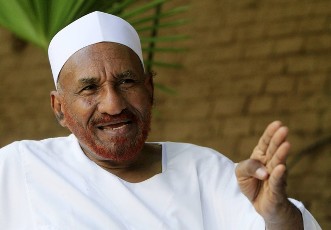Al-Mahdi urges prevention of war between Sudan, South Sudan
February 10, 2012 (KHARTOUM) – A Sudanese opposition leader has called on the international community to preclude a return to war between Sudan and South Sudan, saying that whichever side starts such war should be referred to the International Criminal Court (ICC).

The already tense relationship between Sudan and South Sudan has plummeted in recent weeks due to failure in addressing an array of issues arising from the secession of the South and mutual accusations of supporting rebel groups.
A bitter dispute over transporting South Sudan’s oil via Khartoum and continued failure to resolve it have given rise to talk of war and threats on the part of Khartoum to support southern rebel groups in retaliation of Juba’s alleged support to Sudanese rebels fighting along the poorly defined borders between the two countries.
Al-Mahdi urged the United Nations (UN) to work to prevent a proxy war between the two nations and deploy monitors along the borders, calling on the world body to refer the instigator of such a war to the ICC on the charge of aggression.
The NUP leader also called for international arbitration to resolve issues of contention, stressing that his party rejects war with South Sudan and will not support it unless in the case of self defence.
Sudan’s President Omer Al-Bashir last week said that his country is not seeking war but would fight it if forced to. Similarly, South Sudan’s President Salva Kiir warned that his country should take Bashir’s warning seriously, instructing the army to be on high alert.
Al-Mahdi called on the alliance of rebel groups fighting the in the western region of Darfur and border states of South Kordofan and Blue Nile to agree on a national program that meets the legitimate demands of the people in these areas. He suggested that these rebel forces be allowed to keep their arms until a fair political agreement is signed.
However, he warned rebel groups against receiving support from South Sudan, saying that using Juba as a springboard to attack Khartoum makes for a similar response from Khartoum, adding that the final outcome would be a destructive war between the two countries.
Separately, Al-Mahdi offered a diagnosis of the issues festering within the domestic political arena, accusing the government of President Bashir of allowing corruption to run rampant and of destroying the economy.
President Bashir recently established an anti-corruption body but government officials, including him, continue to deny the existence of widespread corruption despite public perception to the contrary.
Al-Mahdi finally reiterated demands that the ruling National Congress Party (NCP) agrees to dismantle the single party state, conveying to what he termed as the patriotic forces within the NCP his readiness to reach consensus on religious and national pillars and renounce violence.
(ST)
